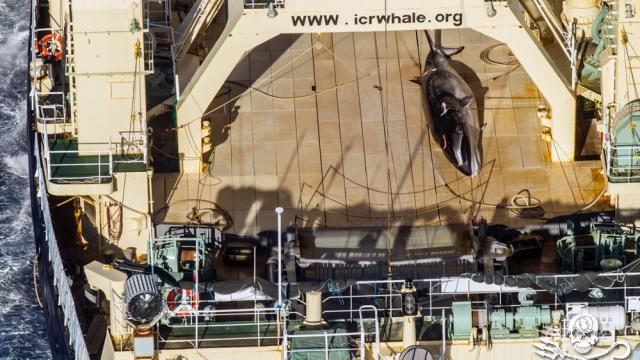In a disturbing repeat of last year, Japanese whalers returned to port Friday with the carcasses of 333 minke whales on board. Since 1986, a global moratorium has banned the hunting of whales, but Japan claims the killings are being done for “scientific research”.
Image: Sea Shepherd
This is nothing new — Japan has been exploiting this scientific research loophole in the international whaling moratorium for years. Specifically, the Japanese fisheries ministry says, “The purpose of this research is to carry out a detailed calculation of the catch limit of minke whales and study the structure and dynamics of the ecological system in the Antarctic Ocean.” Based on the fleet’s most recent expedition to the Southern Ocean, it concluded: “Since a majority of both the males and females taken were mature, this indicates that the species is reproducing healthily.”
Unfortunately, Japanese “scientists” had to butcher 333 minke whales over the past several months to figure this out. And 333 whales the year before. It’s part of a project called NEWREP-A (New Scientific Whale Research Program in the Antarctic Ocean), in which Japan’s Institute of Cetacean Research has mandated the killing of 4000 minke whales over the course of 12 years. Hence, the annualised figure of 333.
The International Whaling Commission (IWC) says this is utter nonsense, claiming the real purpose of the mission is to harvest whale meat. The Australian government has also chimed in, stating: “[We are] deeply disappointed that Japan has decided to return to the Southern Ocean this summer to undertake so-called ‘scientific’ whaling… Australia is opposed to all forms of commercial and so-called ‘scientific’ whaling. It is not necessary to kill whales in order to study them.”
Indeed, the status of these Antarctic whales is hardly a mystery. The IUCN Red List lists them as a species of Least Concern, while the Scientific Committee of the International Whaling Commission estimates a population around a half million. Minke whales are doing just fine — but that doesn’t excuse the actions of Japanese whalers. Minke whales play an important ecological role in the Southern Ocean, and perhaps more to the point, whaling is barbaric practice which involves the harpooning of a highly social and intelligent species.
In a statement issued yesterday, anti-whaling activist organisation Sea Shepherd, which has been tracking the activities of the Japanese fleet, said governments need to do more than just condemn the practice:
We were aware of the challenges from the outset of the campaign — the doubling of the whaling area and the reduced quota that would be easier to reach — but we did our best despite the odds because it was the right thing to do. And — as usual — we did it alone. It is a reminder that the needless slaughter of marine life will continue unless governments stop making hollow statements of disapproval and start taking action to hold Japan accountable.
Nice sentiment, but easier said than done. The world can’t get its crap together about reducing carbon emissions, let alone saving a whale that’s nowhere near the endangered list. That said, there is some hope. Last year, the International Union for the Conservation of Nature said it would revise the review process for whaling, and make it tougher to sell whale meat. At the same time, Australia has put forward a resolution that would require the International Whaling Committee to approve any requests for permits to kill whales for research purposes.
